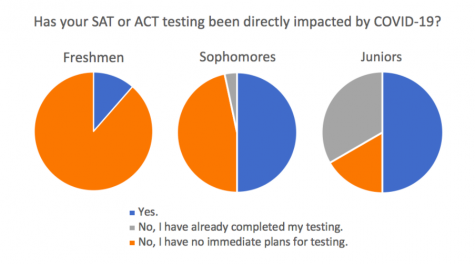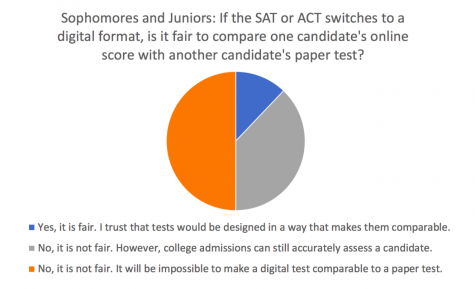Standardized Test Cancellations Due to COVID-19
August 13, 2020
Not even college entrance exams—a time-honored, student-dreaded tradition—are immune to COVID-19. Recent test cancellations have evoked stress in students across the country and many BCA students have been or will be affected by changes to the Scholastic Aptitude Test (SAT) and American College Testing exam (ACT).
Throughout the year, students take the SAT and ACT, which are required on most college applications. These exams serve as a standard to compare students’ math and english proficiencies across various schools across the country. They are administered one Saturday a month, seven months of the year. High schoolers may choose to take these exams at any point during their four years, but the disruptions are especially pertinent to current juniors who will apply to college in the coming months. SAT subject tests have also been impacted. The shorter exams focusing on a specific subject are typically taken right after students complete the related high school class. These are required by a handful of universities and may be considered by others.
An online survey was conducted among 35 freshmen, 30 sophomores, and 36 juniors from the student body. It found that 72% of those BCA juniors are concerned COVID-19 will impact their future testing schedule, and 50% have already experienced test cancellations. Sophomores hoping to get a jumpstart on exams were also affected: 47% of surveyed sophomores had their tests cancelled, and 67% worry their testing schedule will be disrupted. These numbers greatly contrast the freshman who have significantly more time to take standardized testing exams. Only 11% of freshmen have experienced test cancellations, with 34% expressing concern for their future standardized testing schedule.

SAT and ACT cancellations began in mid March. The College Board, maker of the SAT and AP tests, cancelled its May 2 and June 6 SAT test dates and added an extra date on September 26, 2020. This announcement was made just after their March 14 test date when some sites administered the assessment, while others were forced to cancel due to local school closures. ACT, Inc. cancelled its April 4 date and the June date is under review. Regardless, all future test dates are subject to change. Students who are signed up for a cancelled date will receive refunds and have first choice to reschedule. The College Board has also opened up registration specifically to students in the classes of 2020 and 2021 who have not yet taken the exam before opening it up to other students.
Space considerations are a major concern for both tests. The College Board and the ACT have encouraged districts to create more testing sites to accommodate more testers. Social distancing creates another dilemma. If states require testing centers to adhere to six foot distancing regulations, even fewer students can be accommodated.
The College Board announced that “in the unlikely event that schools do not reopen this fall, the College Board will provide a digital SAT for home use.” While the companies may be left with no choice, sophomores and juniors worry it will affect college admissions. 58% of BCA juniors support a digital test, but only 50% of sophomores—who have more time to take the ACT or SAT exams before applying to college—believe a virtual test should be created if the crisis persists. When asked if it is fair to compare one candidate’s online score with another candidate’s paper test, sophomores and juniors had similar opinions. The majority believe the two formats are incomparable, but some of those students still trust admissions officers to make accurate assessments when evaluating students.

One sophomore expressed concern that “online testing might make it hard for some underprivileged students and will also allow rampant cheating to occur so [they] would not be happy if the College Board switched to that format.” Converting the test will be no easy feat. There is no doubt that online testing is a major divergence from in person testing where monitors pay close attention to students.
The College Board has already had experience with virtual testing, as they made major modifications to their Advanced Placement exams due to COVID-19. In an effort to prevent cheating, all multiple choice questions were removed from APs and were replaced with free response questions. Exams were also shortened from two to three hours to 45 minutes. Information about the virtual SAT has yet to be disclosed, but similar strategies may be employed. Unfortunately for students who have spent many hours studying for the original three hour long SAT, this entirely multiple choice test would need a dramatic transformation. *
Luckily for students, some colleges have become test optional. Applicants can decide to submit their score if they believe it enhances their application, but are not required to. During this time, it provides flexibility and reduces stress for students who may not have the opportunity to take a college entrance exam. About 50 schools so far have changed their requirements. Some notable universities include Tufts (which will be test optional for the next three years), Boston University, Cornell University, and the University of California system. Other universities were test optional before the crisis. In fact, the UC system had an existing plan to phase out college entrance exams. While COVID-19 prompted them to become test optional next year, the change will last beyond the virus. However, many other colleges still require scores.
Regardless of what happens to college entrance exams, it is important to note that all students are facing this challenge. To stay updated, regularly check https://pages.collegeboard.org/sat-covid-19-updates and https://www.act.org/content/act/en/covid-19.html.
*After this article was written, the College Board announced it would not create a virtual SAT due to the technical difficulties that occurred during the virtual AP tests.




